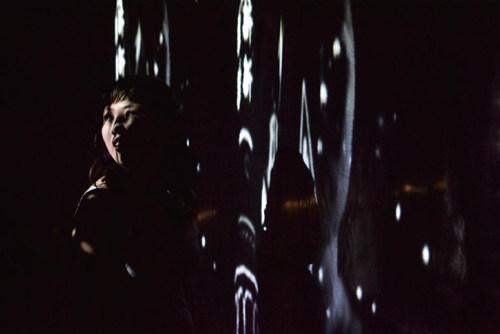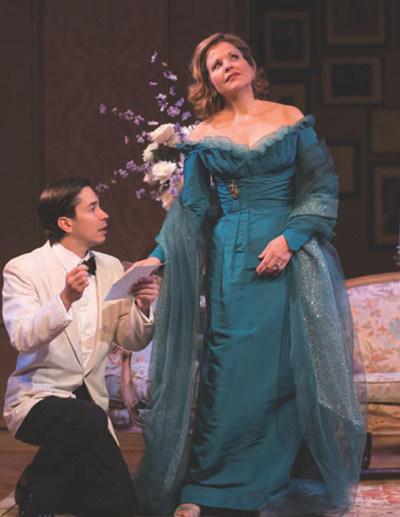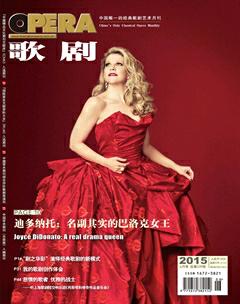銀幕《神女》在舞臺亮相,“巴洛克女王”在音樂廳演出
司馬勤



從來都不屬于那群崇拜阮玲玉的粉絲。我不是中國人,
更不是女性,所以從一開始,我就被逐出了殿堂。我也不算是葛麗泰·嘉寶(Greta Garbo)的影迷——她跟阮玲玉一樣,在默片年代以演妓女一舉成名。但嘉寶的例子卻又有不同:她雖然活到85歲,但電影生涯卻沒有持續下去。有聲電影流行之際,她已毅然離開了娛樂圈。
不可否認,我們每次得悉一個悲慘的生命突然結束,必會感到傷心——更可以用“歌劇性”來形容這類事件——尤其是那些辭別人世的藝術家,他們的一生與所演繹的藝術有不少雷同之處。阮玲玉就是這種人物。還有另一位,就是作家蕭紅。
過去幾年,蕭紅在銀幕上頻頻出現。在許鞍華導演那亮麗的《黃金時代》之前——該作品囊括了一座又一座的電影獎項,可能比買票入座的觀眾還多——有2013年霍建起執導的《蕭紅》。兩部電影公映前后,還有一部像是室內樂歌劇的《蕭紅》。可惜的是,三部作品都犯了同樣的錯誤,而歌劇的效果最為令人失望。正如我之前已經提到的,重塑名人,讓他們在觀眾面前亮相,與把名人故事敘述出來,真的是兩回事。
盡管如此,阮玲玉的個案有點不一樣。關錦鵬于1992年拍攝的《阮玲玉》是個難得的最佳示例:電影敘述阮玲玉的一生,同時也令觀眾領略到這位明星值得敬佩的特點。在電影中,令人感動的細節是從演員張曼玉的口中說出來的。電影中重整1934年經典默片《神女》的各個段落,張曼玉面對鏡頭把阮玲玉的故事訴說出來,更詳細分析了這位明星遺留下來的,影響后世與現代中國女性的意義。雖然《阮玲玉》這部陳述阮玲玉一生作品的電影不一定是最權威的,它卻讓張曼玉于1992年在柏林電影節上榮登了影后的寶座。在過去20多年里,這部電影被公認為最令人信服、最值得欣賞的關于阮玲玉的電影。
這個情況在不久之前卻有了改變,部分原因是更多的觀眾漸漸地熟識了阮玲玉最負盛名的電影。2013年,北京人藝重演19年前以阮玲玉為主題的話劇。在過去的一個演出季里,向來熱愛老上海的紐約前衛吉他音樂家盧卡斯(Gary Lucas)為其配上現場音樂,帶著《神女》這部電影到處巡演。不久以前,英國電影協會(British Film Institute)完成了《神女》的修復版。去年10月份,英國電影協會舉辦倫敦電影節,特地安排一場別開生面的放映會,重金禮聘英國室內樂團(English ChamberOrchestra)同場演奏北京作曲家鄒野的電影新配樂。
你現在或會抱有這個疑問:那么《阮玲玉》的歌劇呢?瑪麗蓮-夢露( Marilyn Monroe)的故事在歌劇舞臺上已經出現過三個版本:1993年,紐約市立歌劇院搬演了艾茲拉·萊德爾曼(Ezra Laderman)的《瑪麗蓮》:2012年,荷蘭歌劇院演出羅賓·迪·拉夫(Robin de Raaff)的《等待夢露小姐》(Waiting forMiss Monroe);英國作曲家格文·布萊爾斯(Gavin Bryar)的《永遠的瑪麗蓮》(Marilyn Forever)于本年3月份在長灘(LongBeach)舉行美國首演。選擇加州長灘這個與好萊塢近在咫尺的地方,簡直是恰當之極。以上三部歌劇都沒有獲得好評——更談不上重演或新制作——因此,也引起了不少樂評家的推測。他們的論點是:本質上,電影明星就不適合被用作歌劇主題。但我不同意。我認為到了今天,還沒有人有技巧、有把握、有效地處理這個主題。
好了,終于進入正題了:現在有一部名叫《神女2.O》的作品。由中國出生、美國長大的藝術家隋然(Michelle Sui)自編、自導、自演的多媒體歌劇。她受過聲樂訓練,而她的演出跨越不同藝術門類。她設計的舞臺布景令人刮目相看,可惜相對來講,演出效果比較遜色。容許我先把制作的強項列出來:在《阮玲玉》這部電影中,導演安排張曼玉扮演阮玲玉,根據原作,演出《神女》的不同片段。隋然用上“綠布景”(chroma-key)科技,把自己的影像介入電影里。整個晚上的演出中,真人版的隋然在投影空間徘徊,以歌聲與獨白回應阮玲玉電影世界中隋然的影像。
這些年來,我看過在舞臺上運用的科技——很多劇院與歌劇院利用投影技術,目的是為了證明昂貴的機器是值得的——但是這一趟,我覺得投影與作品的主題絕對吻合。令我搞不清楚的,卻是這場演出的主要動機。作品沒有懷舊的意味,因為隋然與阮玲玉的年代沒有任何直接的個人關系。我猜,關錦鵬的《阮玲玉》首映當年,隋然還沒有出生。但是,隋然的年齡與當年阮玲玉自殺時年歲(24歲)卻差不多。青春所燃起的那種原始動力,讓《神女2.0》超越了高科技玩樂園的境界。
隋然確實“闖”進了阮玲玉的世界,卻又保持著局外人的身份。我們可以說,隋然創建了多層次的注釋,她所探討的不單是阮玲玉本人與阮玲玉這位藝術家,還有電影媒介的魅力以及崇拜名人的社會風氣。阮玲玉的一生——她出殯那天上海街頭擠滿了人,殯儀隊伍延伸至三英里之外——不可能只是代表一個天真的女子,在一個天真的時代的遭遇?演出當天,觀眾目不轉睛地凝視屏幕上的美女。問題是,隋然成功地帶領了她的觀眾進入阮玲玉的世界,卻沒有任何重要的信息要傳遞給我們。
《神女2.o》今年4月在紐約下城一個名叫“迪科信之地”(Dixon Place)的酒吧劇院演出,深夜時分只演了一場。我覺得用“首演”這個字眼未免言之過早,因為作品還停留在實驗階段。到現在為止,隋然沒有全方位探索自己的思維。但是,“迪科信之地”與那里的觀眾對于這個顯得半生不熟的作品顯然十分寬容。我也同意:我很樂意在未來的日子重返劇院,觀看隋然更成熟的《神女》版本。
上期我討論過深受廣大觀眾愛戴的歌劇女神,卻遺漏了另一位女神。我忘記了,可能是因為她沒有新出版的自傳要推銷,也沒有參加百老匯劇目,還有就是:她并不是女高音!可是,當我們談及今時今日,吸引新觀眾的熱門歌唱家的時候,喬伊斯。迪多納托(Joyce DiDonato)是不可或缺的重要人物。
幾周前,我終于在香港遇上了迪多納托小姐,她在中國巡演,音樂會命名為“巴洛克女王”。突然之間,我明白為什么我忽略了她。蕾內·弗萊明( Renee Fleming)與黛博拉。沃伊特(Deborah Voigt)這兩位女高音致力于拓展歌劇舞臺以外的新觀眾群。迪多納托卻在歌劇這個范疇內自得其樂,把新觀眾引入歌劇世界。
正當弗萊明與沃伊特這兩位美國女高音用盡法寶——盡管她們的秘密法寶截然不同——來證明她們只不過是“普通人”,她們都沒有像迪多納托那么成功,在過去十年來創建了著名的“洋基歌劇女王”(Yankee Diva)博客。迪多納托的筆鋒銳利,除了描述音樂以外,更披露后臺的點滴、巡演的苦樂,以及她隨時隨地想分享的事物。迪多納托也有自己的YouTube頻道(名為“Yankeediva”),讓她拓展欣賞歌劇、音樂會或者大師班以外的觀眾——同樣也讓觀眾有機會反饋意見,與她建起了聯系。
迪多納托一手一腳建立起的社交媒體,看起來真的有點厚顏無恥,甚至令人發笑,但這種厚臉皮有時候卻是關鍵之所在。4月份,當她剛好完成了自己策劃、展示自己喜好多種音樂風格的“角度”(Perspectives)系列演出后,迪多納托被委任為卡內基音樂廳董事局成員。在這系列演出進行期間——剛好與美國總統選舉起步同時——不少卡內基觀眾帶著“支持喬伊斯”(Pro-Joyce)字眼的、好像是競選總統的別針。
十年前,那些食古不化的古典音樂人或許會批評迪多納托是毫無實際的夸夸其談罷了。就算今天,我們也很難鑒定,媒體推廣與藝術有什么直接關系。這樣說吧,必須先達到藝術巔峰,才可以談及其他。但是,現今社交媒體的規模越見鞏固——從很多角度來說,它已經超越了傳統媒體——它也脫離了“市場推廣”的銅臭,與觀眾建立了更為純粹的互動聯系。
“巴洛克女王”就是一個最好的例子。在亞洲,通常任何獨唱音樂會(不只是女中音獨唱音樂會)的出票情況都是很棘手的問題。如若選擇演出17、18世紀的冷門曲目,那更加是個愚笨的方案,盡管曲目冠有“王室”主題或打著由格萊美大獎歌唱家錄制成唱片的旗號。但這次,我可以向你保證:在香港,那位“洋基歌劇女王”的演出,卻出其不意地賣了個滿堂紅。
上月我提到蕾內·弗萊明與她在百老匯主演的鬧劇《靠愛活著》(Living On Love)。讓我告訴你們吧:只靠愛情,真的活不下去。雖然原計劃該劇只安排演至夏天,制作人卻在托尼獎入選名單公告后宣布了取消演出。原因很簡單:《靠愛活著》連一個托尼獎提缶都沒有:最后一場演出在5月3日舉行。這部劇在百老匯的壽命很短:21個預演場次加16場正式演出。
《靠愛活著》于4月20日開演后,劇評褒貶不一。《紐約時報》認為弗萊明的人物太溫柔,一點都沒有歌劇女王那種霸氣與潑辣。而《華爾街時報》的評論更苛刻:“一丁點都不幽默,令觀眾感到沮喪,恐怕今后都沒有機會大笑了。”大部分劇評都埋怨祖·迪彼爾特羅(Joe DiPietro),說他的劇本令人失望。
取消制作的另一個原因,可能是朗埃克劇院。上月,我已經提醒過大家:這個劇院在過去的一百年來,從來沒有搬演過成功的長壽的百老匯劇目。關于《靠愛活著》的停演,大家應該心里有數了。
I've never belonged to the cult of Ruan Lingyu. Being neitherChinese nor a woman, I was pretty much excommunicated from thestart. I also wasn't much into Greta Garbo-another silent-filrn starfamous for playing a prostitute. Though in Garbo's case, it was onlythe career that died young.
There's something undeniably touching-operatic, you mightsay-about a tragic life coming to such an abrupt end, especiallywhen that person is an artist whose life so resembles the work. Ruanwas such a figure. So, too, was the writer Xiao Hong.
Xiao Hong has recently found life anew on the silver screen. Evenbefore Ann Hui's luminous Golden L'ra-a film that may possiblyhave garnered more awards than actual viewers-there was alsothe 2013 biopic Falling Flowers. In between came an opera of sortsentitled Heart of Coral, which sufiered from the same faults as thefilms, only more so. As I've said before, holding famous charactersup to the audience is not the same as telling their stories.
The Ruan case, though, has been a bit different. StanleyKwan's1992 film Cen,ter Stage was that rare example of a biopic thatboth told its story and let audiences know exactly why its subjectwas so great. Most of the details came, appropriately enough, fromthe mouth of Maggie Cheung, who in between recreating iconicscenes from Ruan's film The Goddess (1934), spoke at length oncamera about what Ruan's story and legacy meant to her as both anactress and a Chinese woman. It may not be a definitive statement,but Cen,ter Stage-which garnered Cheung a Best Actress award at1992 Berlin Film Festival-remained the final word on the subjectfor at least two decades.
That seems to be changing, partly because more people havediscovered Ruan's most famous film. In 2013, the play Ruan Lingyureturned to the Beijing People's Arts Theatre for the first time in 19years. Last season, The Goddess began touring the US with a newlive score by Gary Lucas, a New York-based avant-garde guitaristwith a love for old Shanghai; then the British Film Institutelaunched a newly restored version of'the original fllm. Last October,the BFI London Film Festival featured a screening of the film withthe English Chamber Orchestra playing a newly commissionedscore by the Beijing-based composer Zou Ye.
So where, you rrught ask, is Ruan Lzngyu: The Opera? Especiallywhen we've seen at least three operas devoted to Marilyn Monroe(Ezra Laderman's Marzlyn, at New York City Opera in 1993, Robinde Raaffs Wazting for Miss Mon,roe at the Netherlands Opera in2012, and Gavin Bryars' Marilyn. Forever, which had its US debutin March, appropriately enough, near Hollywood in Long Beach,California). That few of them have gotten good reviews-or evensubsequent productions-have led some critics to claim that moviestars are inherently inappropriate subjects for opera. I disagree. Itonly means that no one yet has gotten it right.
Which brings me to Goddess 2.0, a multimedia opera conceived,directed, designed and starring the young Chinese-born, US-educatecl singer and interdisciplinary artist Michelle Sui. The setupwas striking; the results less so. But first, the strong points: unlikeMaggie Cheung, who had to recreate scenes from ThE Goddess, Suiused chroma-key ("green-screen") technology to insert herselfintoactual footage from the film. The evening unfolded with the live Suicircling the projection area, responding vocally to images of herselfin Ruan's cinematic world.
Of all the recent uses of technology I've seen onstage-mosttheatre and opera companies seem to employ projections mostlyto justify the cost of the equipment-this was one of the few thatmakes total sense with its subject. What wasn't so clear was theprimary impetus. It wasn't proper nostalgia, since Sui has nopersonal recollections of Ruan's era. She probably wasn't evenborn when Kwan's Cen,ter Stage came out. But Sui being not muchyounger than Ruan at the time of her suicide (at age 24) surelysparked much of the raw power that made Goddess 2.0 more thanjust a playground for high-tech toys.
By literally breaking into Ruan's world while still remainingoutside, Sui set up multiple layers ofcommentary not just on Ruan,the person and artist, but also on the seductiveness of the mecliumitself and the cult of celebrity it generated. How can we think ofRuan's story-or her legendary three-mile funeral procession-as merely a nalve woman m a naIve time when even the audienceat Sui's show had their eyes glued to the screen? The problem wasthat, after effectively enticing her viewers, Sui soon fell short ofthings to say.
Goddess 2.0 made a late-night, one-time-only appearance lastmonth in a New York downtown venue called Dixon Place. Ihesitate to call it a "premiere" because it was in no way a fmishedpiece. Nor can I believe that Sui has fully explored her thoughtson the subject. But both Dixon Place and its audience seem highlyforgiving ofideas that are-in the most generous use of the term-half-baked, and I for one will gladly return whenever Sui decides toput her project back in the oven.
My account last month ofthe battle of'the populist divas had oneglaring omission, probably because she wasn't hawking a book orworking on a theatre piece. And probably, too, because she's not even a soprano. But no report of singers embracing new audiencesis complete without mentioning Joyce DiDonato.
I finally caught up with Ms. DiDonato last month in HongKong on her "Drama Queens" tour, and suddenly it becameall too apparent how I overlooked her. Unlike Renee Flemingand Deborah Voigt, the two sopranos most overtly recruitingaudiences beyond the opera stage, DiDonato remains in placeand brings audiences to her.
While Fleming and Voigt, both American singers, have bothgone to great-ifvery different-lengths to prove that they're 'just normal people:' neither could credibly generate a blog called "YankeeDiva," as DiDonato has clone for the past decade, writing not onlyabout music but also backstage antics, life on the road, and basicallywhatever runs through her mind at any given moment. That,together with her own YouTube channel (also called "Yankeediva"),has extended her reach well beyond the usual audience capacityfor opera, concerts or master classes-and also given audiences achance to reach back to her.
The brazenness of'DiDonata's one-woman social-media campaignis often laughable, which can be the point. In April at Carnegie Hall,where she'd just fmished curating a "Perspectives" series showcasingher wide-ranging musical interests, DiDonato was elected to theBoard of Trustees. Throughout much of her series-corresponclingwith the start ofthe US presidential race-Carnegie Hall audienceshad been bombarded with campaign buttons declaring "Pro-Joyce."
Ten years ago, cynics in the classical music world would'veciismissed all this as hype, and even today it's hard to argue that itadds anything directly to the artistry. Indeed, the artistry has to bein place already. But as social media has become more entrenched-in many ways transcending traditional media-it's also removedmuch of the stigma from marketing, returning that much-malignedfield to its humble roots in audience connection.
"Drama Queens" was a prime example. In Asia, where any vocalrecital (not just a mezzo-soprano) is a tough sell, an evening of 17th-and i8th-century obscurities would be foolhardy, no matter howclever its royal-themed program, or how well it had been recorded by a Grammy-winning vocalist. But rest assured, in Hong Kong theYankee Diva brought audiences out in droves.
Speaking of Renee Fleming, Livin.g On Love, the Broadway farceI featured last month, proved unable to live solely on love. Althoughthe comedy had been scheduled to run only through the summer,the producers closed the play immediately after it failed to garnerany nominations for the 2015 Tony Awarcls. The final showing wason May 3, after only 21 previews and 16 regular performances.
Reviews, too, had been decicledly mixed, with the New YorkTimes claiming that Fleming seemed way too nice to be playing adiva, while the Wall Street Journal called it "so unfunny as to makethe viewer despair of ever laughing again." Most critics blamed JoeDiPietro's script.
Or maybe it was just the Longacre Theatre, which as I'dmentioned last month has never had a successful long run inits hundred-year history. The closing shouldn't be much of asurprise.

